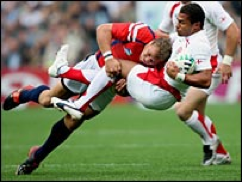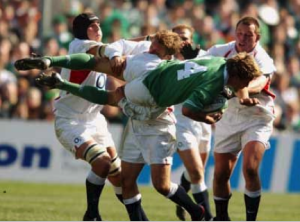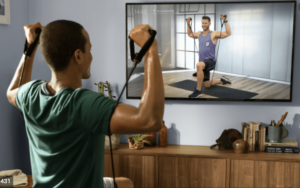 The issue of tackling in rugby has been big news recently. We’ve seen a collective of 70 concerned health professionals and academics send an open letter to the UK Government calling for a ban on tackling in schools rugby.
The issue of tackling in rugby has been big news recently. We’ve seen a collective of 70 concerned health professionals and academics send an open letter to the UK Government calling for a ban on tackling in schools rugby.
The UK Government has now confirmed that it currently has no plans to ban tackling in schools rugby.
Check out their response here, however, it is worth discussing this issue as there has been a lot of discussion in the media both in support of and opposed to the ban.
I am sure you can imagine most of the arguments that have been trotted out. The petition calling for tackling to remain in schools rugby, which the UK Government responded to, was signed by 23,255 people and counting. Columnists as diverse as former Irish international lock Neil Francis and Times restaurant critic Giles Coren have given their views in print (Coren’s article in the Times of 5th March 2016 is especially amusing!). it was even debated on BBC Question Time, so it’s safe to say this issue has had a lot of airtime recently.
 What I don’t propose is to rehash all the arguments as these should be pretty much public knowledge.
What I don’t propose is to rehash all the arguments as these should be pretty much public knowledge.
Professor Allyson Pollock is the cheerleader for this campaign, having seen the damage suffered by her son Hamish, during school rugby. I would like to add here that I think Hamish was dealt with inadequately by his school coach and that Pollock’s concerns should have been taken seriously. However, I also think that professor Pollock has lost all professional detachment on this issue and judges the whole of the game through the prism of this negative experience – in fact, rather than a cool and reasoned medical professional, she comes across more like a disgruntled mum.
So what is my point? Is it a concern that some former players have suffered rugby-attributed symptoms ranging from general cognitive dysfunction to motor neurone disease (MND)? Of course it is. The ravages of MND on former Springbok Joost van der Westhuizen are heart-breaking to see, especially to those of us who remember this magnificent player in his prime. To think that the game he loved has done that to him is tragic.
Is it a concern that owing to the bulking up of international and elite domestic players, every collision in a top rugby match now resembles a small-to-medium-sized car crash in terms of the force going through players’ bodies? You bet. The injury stats for the Aviva Premiership show something like 25% of players out injured at this stage of the season, while Ireland’s injury issues in the current 6 Nations campaign, and Wales’s during the World Cup last year, are well documented.
Is it a massive concern that the influence of this trend in elite rugby is seen further down the pyramid, not only in the 1st XVs of grassroots clubs but also in age grade rugby where we hear of U14 teams having conditioning coaches? Too right. Trying to turn young kids into miniature versions of James Haskell or Courtney Lawes is insane, and I’ve put my concerns about this on record before.
So, if we accept that the increase in size and aggression from top players, and the change in tackle philosophy from simply stopping the ball carrier to smashing him, are contributing factors in the increasing incidence of concussion type injuries, what then must we do?
The Solution
First of all, banning the tackle in age grade rugby (because you can’t just ban it in schools) is a non-starter. This would expose boys on leaving school to playing adult rugby alongside older, bigger, heavier players, without the knowledge of how to tackle and take contact safely. All this would achieve would be to defer the issue to a later date.
Since tackling must stay in the game, what really needs to happen is that tackling and the other contact phases of rugby, need to be taught thoroughly by qualified coaches with rigorous emphasis on correct technique and player safety.
As a club rugby coach, I know this is happening to a greater or lesser degree in the majority of clubs, though should also add that I’ve encountered coaches for whom it appears that safety takes a back seat in the pursuit of those all-important U10 victories.
I also have experience of teaching in prep school and again have worked really hard on technique, safety and player welfare. But clearly there are schools, just as there are clubs, where other factors are higher priority – for example the desire of the school to win its games.
This could be exacerbated by the fact that in many schools, rugby is taught by PE teachers who may not be rugby specialists, lacking the technical knowledge to deliver contact training safely.
So as well as addressing the coaching of the tackle, we need to achieve a change in mind-set of coaches and perhaps collectively of clubs and schools. Winning games needs to be less important, technique and player safety more so.
If we’re less bothered about winning, then we’re less likely to tell players to tackle hard and aggressively to intimidate the opponent. They are then more likely to pay better attention to good technique, especially if we as coaches praise them for that rather than how hard they fly in to contact.
Less concern about the result of the game will also help coaches make the right decision during games when a key player takes a blow to the head. At the highest level, last year’s 6 Nations saw a worrying incident when Wales wing George North returned to the field after a kick to the head that left him dazed. He then suffered a further blow to the head and was out before he hit the ground – yet still recovered and was allowed to return to play.
Former England player Shontayne Hape tells disturbing tales of being pressured to play on after suffering a blow to the head. This sets a terrible example to the rest of the game: that no matter if a player has suffered head injury, if the game is important and the player important to the team, their safety takes second place.
In England, grass-roots and age grade club coaches have had a lot of input recently on concussion awareness. The HEADCASE initiative gives vital information for coaches and parents on what to do if they suspect a concussion has taken place. We err on the side of caution, and if the player is found to have been concussed, they follow a return to play pathway to keep them healthy.
Like myself, there are many well-qualified and safety conscious coaches in clubs delivering full contact rugby perfectly safely. If there is concern about how rugby is taught in schools, my response would be ‘Use me’. Bring in coaches from clubs to supervise rugby training where the PE staff lack the experience of the game to deliver it safely.
Schools and clubs also need to look at their rugby offering and give thought to allowing players who don’t relish full contact rugby the chance to play touch rugby instead.
Far from being a ‘watered-down’ version of the game, touch is fast-moving and dynamic, great for fitness and a wonderful way to develop game awareness, evasion and handling skills.
What we don’t need to do is apply a blanket ban on tackling for youngsters. Education of coaches and parents, monitoring of coaching and reporting of injuries are a far more useful way to tackle the issue while maintaining the integrity of the game.
More Information
If you would like more information, please check out our book “Mini and Youth Rugby: Complete Guide for Coaches and Parents”, which is now available on Amazon here. In this book we cover this topic in-depth and address what we believe to be the best strategies and outcomes for mini and youth rugby.








 When most people hear the word “Peloton” they think of an expensive black bike with shiny red buttons and that controversial commercial where the husband gifted his wife a Peloton for Christmas.
When most people hear the word “Peloton” they think of an expensive black bike with shiny red buttons and that controversial commercial where the husband gifted his wife a Peloton for Christmas. If the app interests you, Peloton is currently offering a 30 day FREE TRIAL, so why not give it a try? Check it out
If the app interests you, Peloton is currently offering a 30 day FREE TRIAL, so why not give it a try? Check it out 

 This article would not be complete, however, if we did not acknowledge some of the delivery issues that have been plaguing Peloton over the last year. Most of the delivery issues seem to affect U.S. deliveries, however, the UK deliveries have been affected as well.
This article would not be complete, however, if we did not acknowledge some of the delivery issues that have been plaguing Peloton over the last year. Most of the delivery issues seem to affect U.S. deliveries, however, the UK deliveries have been affected as well.







